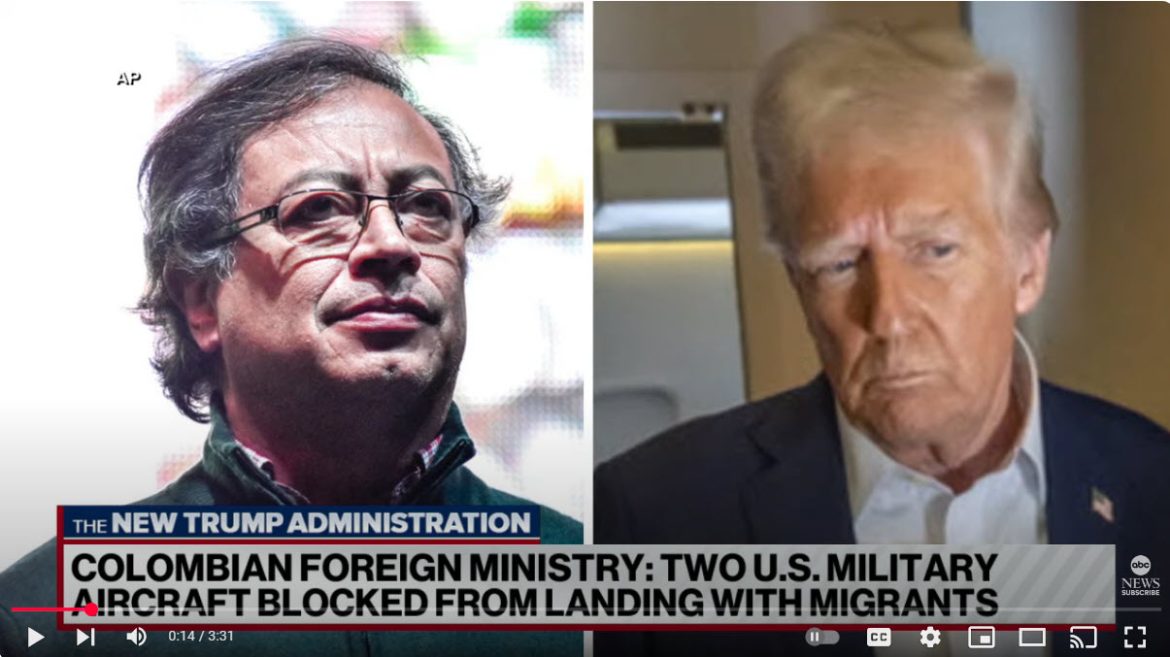In a significant diplomatic shift, the White House announces that Colombia has agreed to terms laid out by President Donald Trump, following the U.S. president’s threat of sweeping economic and political measures against the South American nation. The agreement comes after Colombia initially turned away two U.S. military planes carrying deported Colombian migrants.
The two C-17 aircraft, departing from California, were carrying approximately 160 Colombian migrants. Colombia’s refusal to accept the flights prompted a sharp response from the Trump administration. President Trump took to Truth Social on Sunday, announcing plans to impose a 25-percent tariff on Colombian imports, implement visa sanctions on Colombian government officials, intensify customs inspections, and levy financial penalties on businesses linked to the country.
The White House confirms that Colombia has now agreed to “the unrestricted acceptance of all illegal aliens from Colombia returned from the United States.” The statement further notes that while drafted measures on tariffs and sanctions will not be enacted immediately, they remain “held in reserve” and will be signed if Colombia fails to honor the terms of this agreement.
The diplomatic standoff began after Colombia denied entry to the deportation flights, citing concerns over the U.S.’s handling of the repatriation process. This move marked an unprecedented escalation in tensions between the two allies, as Colombia had historically cooperated with the United States on migration matters. President Trump’s response included a warning that the U.S. would no longer tolerate any resistance to its deportation policies.
The agreement is seen as a win for the Trump administration, which has prioritized strict immigration enforcement and highlighted its readiness to leverage economic measures to achieve compliance from foreign governments. The White House describes the agreement as a “necessary step” to uphold U.S. immigration policies and ensure cooperation from partner nations.
Critics, however, warn that the aggressive tactics employed by the administration could strain relations with Colombia, a long-standing ally in Latin America. Colombia is a key partner in counter-narcotics operations and regional security initiatives. Some foreign policy experts express concerns that the episode could undermine trust between the two nations and complicate future cooperation on broader issues.
For Colombia, the agreement averts the immediate imposition of tariffs, which could have severely impacted its economy. Colombian exports to the U.S. include coffee, flowers, and textiles—industries that would have been significantly affected by a 25-percent tariff. Colombian officials have yet to issue a detailed public statement on the agreement but are reportedly focused on maintaining economic stability and avoiding further escalations with the United States.
The incident underscores the Trump administration’s increasingly transactional approach to foreign relations, using economic leverage to enforce its immigration agenda. While the immediate crisis appears resolved, analysts suggest that the episode could serve as a precedent for similar standoffs with other nations.
The agreement also highlights broader challenges in managing migration flows, particularly as deportation numbers remain high. The U.S. continues to grapple with the complexities of enforcing immigration policies while relying on cooperation from other countries to manage deportations effectively.
As Colombia moves to implement the agreement, both nations face the task of rebuilding diplomatic trust and ensuring the smooth execution of the new terms. The global implications of this incident are likely to influence how other countries approach negotiations with the Trump administration moving forward.



